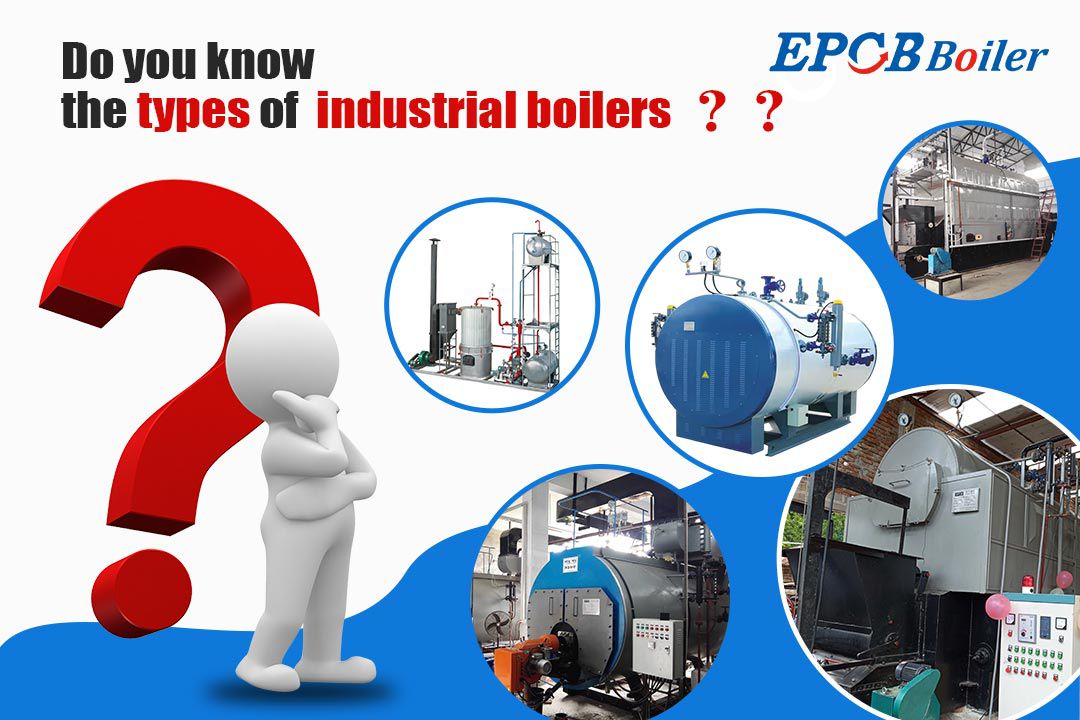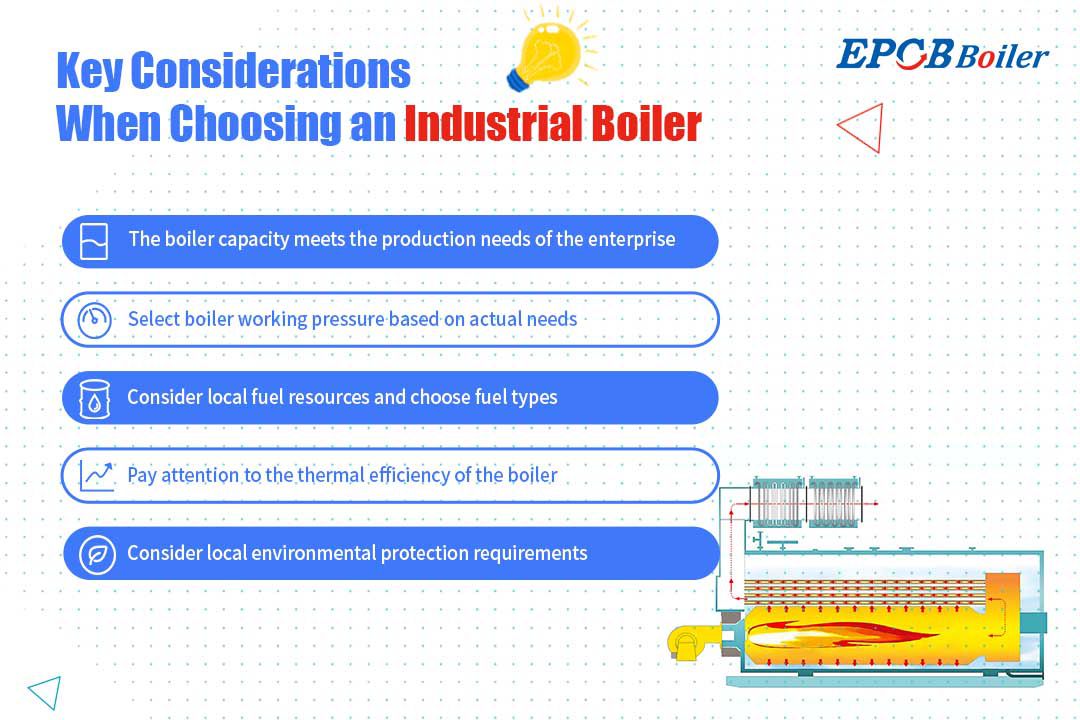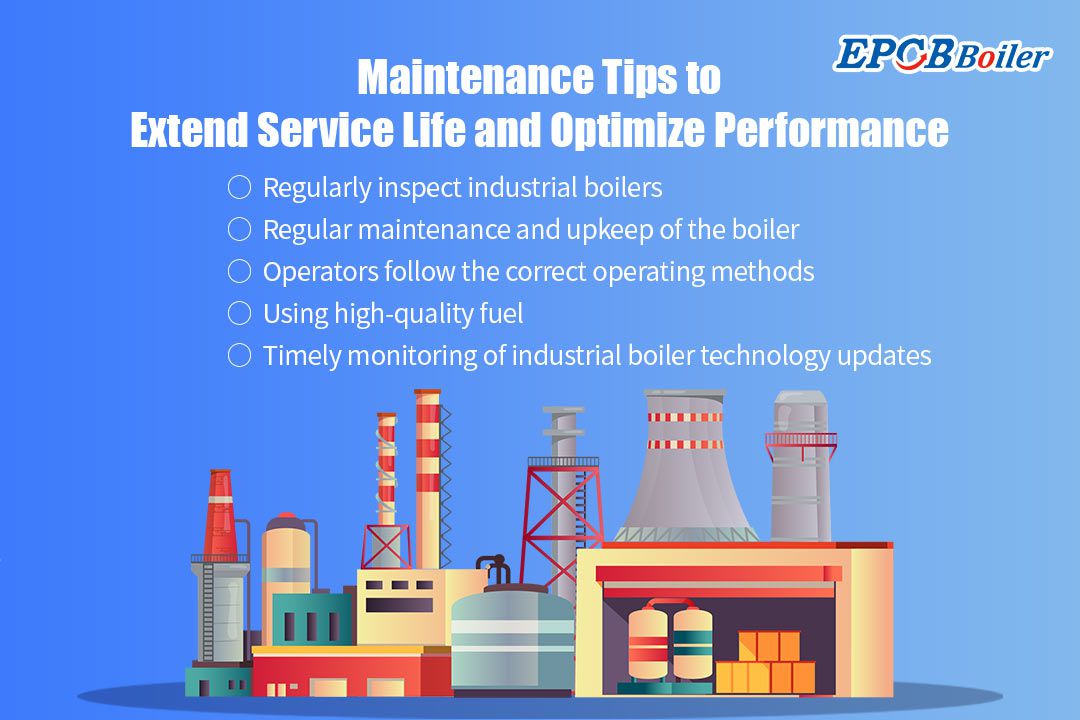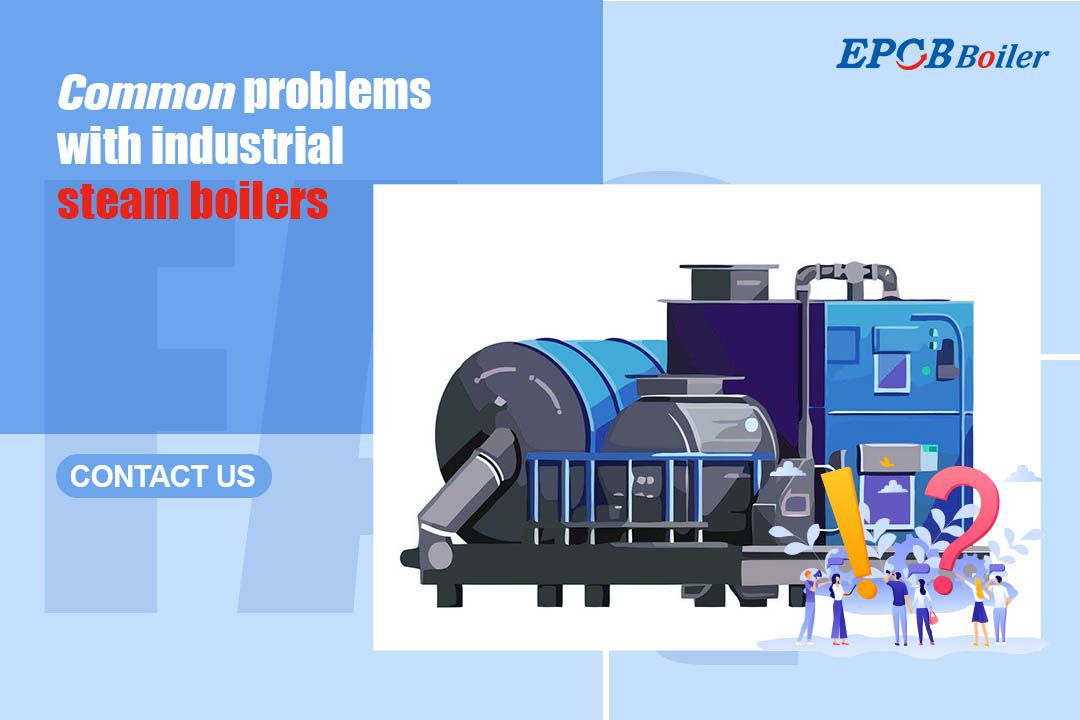Introduction to Industrial Steam Boilers

An industrial steam boiler is a piece of equipment designed to generate steam, providing an efficient, environmentally friendly, and reliable energy solution that is commonly used in a variety of industries for power generation, process heating, and other thermal energy applications. Industrial steam boilers play an important role in a variety of industries and play an integral part in modern society.
The importance of industrial steam boilers in power generation cannot be overstated. In thermal power plants, the steam boiler is the core equipment, which burns coal, oil natural gas and other fuels to produce high-temperature and high-pressure steam, which drives the turbine to rotate and drive the generator to generate electricity.
In industrial production processes, such as textiles, food processing, paper making, etc., a large number of high-temperature and high-pressure steam needs to be utilized for the production process. These industries can not maintain their normal production operation without a suitable energy system. This is where industrial steam boilers become particularly important. They provide a steady supply of high-pressure, high-temperature steam to meet the heating needs of a wide range of industries and reduce emissions through energy-efficient technologies and pollution treatment systems for sustainable development.
Industrial steam boilers are widely used not only in energy conversion and process heating, but also in many other industries. For example, steam is used in medical facilities for sterilization and disinfection processes; in the petrochemical industry for distillation and evaporation processes; and in the pulp and paper industry for paper production processes. In short, industrial steam boilers play a vital role in all industries, providing the necessary heat resources for production and life.
Types of Industrial Steam Boilers
Fire Tube Boilers
Fire tube boilers are an efficient and popular type of boiler that is widely used in several industries. It offers many advantages such as low maintenance costs, high efficiency, and reliability.
It works by heating water to boiling, creating high-pressure steam, and then using the pressure of the steam to drive a turbine or other power plant. A fire tube boiler usually consists of a boiler shell, combustion chamber, flue tube (fire tube), water tubes, and boiler accessories.
During operation, water flows from the external cylinder into the internal tubes and is heated to a boiling state along the tubes. Steam is eventually released through the exhaust port, and the released steam is transported through the tubes to where it is needed to drive machinery and equipment or for heat supply and so on.
Fire tube boilers are used in industries such as food processing plants, chemical plants, and pharmaceutical companies. They often require large amounts of hot water or steam to produce their products, and fire tube boilers provide the best solution through their high efficiency. It is also widely used for heating systems in residential and commercial buildings and excels in terms of fuel consumption.
In addition to the economic advantages, fire tube boilers offer reliability and safety. Temperature and pressure can be detected in real-time by monitors during operation to avoid any mishaps. Maintenance requirements are relatively simple, requiring only regular cleaning and replacement of parts to extend the service life.
Water Tube Boiler
A water tube boiler is a kind of energy-efficient heating equipment, which uses water circulation to transfer heat. It mainly consists of a boiler cylinder, convection tube bundles arranged inside, and an exhaust device. This special structural design can effectively improve the heat transfer efficiency, and make the water from the low-temperature region through the water tube to be heated and then returned to the cylinder to form a closed cycle. Water tube boilers are usually divided into various types, such as natural circulation boilers and forced circulation boilers.
As they use pure and naturally non-polluting ordinary water as the work material, they do not produce any waste and secondary pollution problems during operation, and therefore fully comply with the environmental performance requirements of today's society. Due to the use of circulating heating, water tube boilers are more energy efficient than traditional boilers, and the operating costs are more economical.
Because water tube boilers are designed to withstand higher pressures, they are often used in industrial applications that require large quantities of high-pressure steam. Examples include power plants, chemical plants, paper mills, food processing plants, and other large industrial sites that generate steam for use in a variety of processes and equipment.
Electric Boiler
An electric boiler is a type of boiler equipment that utilizes electrical energy as an energy source and converts electrical energy into heat energy using an electrical resistance heating element, thereby generating steam or hot water. It does not require fuel combustion like gas or oil boilers, so there is no exhaust gas emission and it is environmentally friendly and non-polluting. An electric boiler usually consists of a heating element, a control system, and a safety device.
Electric boilers convert electrical energy directly into heat energy in the heating process, which is more energy efficient and environmentally friendly than coal or gas boilers. Electric boilers are compact, easy to install, and can be flexibly arranged in places that need heating, and are suitable for heating and hot water supply needs on a variety of occasions.
Electric boilers have obvious advantages in environmental benefits, can effectively reduce the emission of pollutants, and improve the efficiency of energy utilization, in line with the needs of modern society for clean, sustainable development.
Electric boilers are suitable for a wide range of sectors, including residential, commercial, and industrial environments. They can be used to heat hot water in homes, office buildings, schools, hospitals, and even large factories. Their compact size and ease of installation make them a convenient choice for a variety of applications.
Biomass Boilers
A biomass boiler is a type of thermal energy equipment that can utilize renewable energy sources. It uses biomass (such as wood, straw, vegetable oil, etc.) as a fuel and causes it to release heat energy through the action of high temperature and pressure. This technology can not only effectively utilize renewable resources, but also make a significant contribution to the promotion of sustainable development.
1.The use of biomass boilers can replace traditional fossil energy sources (e.g. coal, oil, natural gas) and reduce dependence on limited resources.
2. The use of biomass boilers can help reduce carbon emissions and minimize the impact of climate change.
3. Biomass boilers can promote the development of the agricultural circular economy model. The use of biomass boiler technology can convert waste into renewable energy, reduce treatment costs, and drive the development of related industrial chains.
4. In the process of use can also be recycled some beneficial elements and reapplied to the soil, to promote crop cultivation and improve land utilization.
Overall, biomass boilers, as a renewable energy utilization technology, play a crucial role in promoting sustainable development. We should actively promote its use and strengthen the formulation of relevant policies and regulations to ensure its healthy development. We believe that shortly, biomass boilers will become an important force in promoting the sustainable development of human society!
High-Pressure Boilers and Low-Pressure Boilers
The working pressure of the boiler can be divided into high-pressure boilers and low-pressure boiler industrial steam boilers, both are used to produce steam equipment, but there is a clear difference.
High-pressure boilers and low-pressure boilers differ in the pressure they can withstand when in use. High-pressure boilers are generally able to reach steam pressures of more than 3MPa, while low-pressure boilers can usually only reach less than 2Mpa.
High-pressure boilers and low-pressure boilers also differ in their construction. Due to the need to withstand higher temperatures and pressures, high-pressure boilers are usually made of steel and have a more complex and rigorous structural design. Low-pressure boilers, by contrast, have less stringent material requirements and are usually made of iron or copper.
There is also a clear difference between high and low-pressure boilers in terms of use. High-pressure boilers are usually used in industrial production that requires high-temperature and high-pressure steam, such as the power generation process in power plants, chemical plants, chemical production, etc. Low-pressure boilers are mainly used for general heating and hot water supply, as well as some industrial processes that do not require high temperatures, such as heating and hot water supply in buildings, schools, and hotels, as well as hot water demand in food processing, washing, and other fields.
Both types of boilers are very important in terms of the industries they serve. High-pressure boilers mainly serve the industrial sector, such as power generation, chemical, pharmaceutical, textile, paper, and other production processes that require large quantities of high-temperature and high-pressure steam. Low-pressure boilers mainly serve the commercial and civil sectors, such as heating and hot water supply in buildings, schools, hospitals, hotels, etc., and hot water demand in the fields of food processing, washing, and automobile washing.
Modular Boiler
The introduction of modular boiler design ideas makes the boiler system better able to adapt to the needs of enterprises at different stages of development, whether it is the increase or decrease of production capacity or technological upgrades, which can be realized through the addition, deletion, or replacement of modules.
First of all, the flexibility of the modular boiler is reflected in its ability to be customized according to the actual needs of enterprises. Enterprises can choose the right combination of modules according to their current production scale, energy demand, and environmental standards to build a boiler system that meets their needs. This customized design not only meets the actual needs of enterprises but also avoids the waste of resources and improves energy efficiency.
Secondly, the expandability of modular boilers provides strong support for the development of enterprises. With the expansion of the enterprise scale or the increase in production demand, the capacity of the boiler system can be expanded by adding new modules. This expansion process is simple and fast, without the need for large-scale transformation or upgrading of the entire system, which greatly reduces the investment cost and time cost of the enterprise.
In addition, the modular boiler also has good maintainability and upgradeability. Each module is an independent unit that can be serviced, replaced, or upgraded separately without affecting the normal operation of the entire system. This design makes the maintenance of the boiler system more convenient and also provides the possibility of future technological upgrades for the enterprise.
Combination Boilers
A combi boiler is truly a dual-function device that can excel in specific environments.
Firstly, one of the distinguishing features of a combi boiler is that it combines the dual functions of heating and hot water production. This design allows the boiler to meet heating needs while also providing a constant and sufficient supply of hot water for domestic or industrial premises. This greatly simplifies equipment configuration, improves energy efficiency, and makes it easier for users to meet a variety of hot water needs.
Secondly, combi boilers are particularly suitable for environments that have specific requirements for heating and hot water needs. For example, in some industrial production sites or large residential buildings, the demand for heating and hot water is large and stable, and the combination boiler can meet this continuous and efficient energy supply needs. At the same time, their compact construction and flexible installation make them ideal for these environments.
In addition, the energy efficiency of the combi boiler is one of the key reasons for its popularity. Thanks to its highly efficient combustion and heat exchange technologies, it can ensure heating effectiveness while minimizing energy waste. This not only helps to reduce running costs for users but also helps to achieve the goals of environmental protection and sustainable development.
Key Considerations When Choosing an Industrial Boiler

Several key factors come into play when choosing an industrial boiler. From efficiency and reliability to environmental impact and cost-effectiveness, making the right choice is critical for industries across the globe. Let's take a deeper look at the key considerations that influence this critical decision-making process.
Factors affecting the selection of an industrial boiler
Capacity: The capacity of the boiler should be determined based on the production needs of the organization. Too little capacity may result in insufficient capacity and affect productivity; too much capacity may result in wasted energy and unnecessary investment costs. Therefore, when choosing a boiler, the production scale and development plan of the enterprise should be fully considered to choose the appropriate capacity.
Pressure requirements: the working pressure of the boiler is also an important consideration. Different production processes have different pressure requirements for steam or hot water, so you need to choose the right boiler working pressure range according to the actual demand.
Fuel type: the type of fuel directly affects the operating costs and environmental performance of the boiler. When choosing a boiler, the availability of local fuel resources, prices, and environmental requirements should be considered. Common fuel types include coal, oil, gas, etc., which can be selected according to the actual situation.
Efficiency: The efficiency of the boiler is directly related to energy consumption and production costs. An efficient boiler can reduce energy consumption and improve the economic efficiency of the enterprise while ensuring production capacity. Therefore, when choosing a boiler, attention should be paid to its thermal efficiency, combustion efficiency, and other performance indicators.
Environmental impact: With the improvement of environmental awareness, the environmental performance of boilers is getting more and more attention. When selecting a boiler, the type and concentration of its emissions should be considered to ensure compliance with local environmental regulations. At the same time, you can choose a boiler that adopts low-NOx combustion technology, flue gas desulfurization and denitrification, and other environmental protection measures to reduce the pollution of the environment.
Maintenance Tips to Extend Service Life and Optimize Performance

Regular inspection: Regularly inspect the boiler, including the burner, water level meter, safety valve, and other key components to ensure its normal operation. Discover problems and deal with them promptly to prevent the failure from expanding.
Maintenance: Regularly carry out maintenance work such as cleaning, descaling, and lubrication on the boiler to keep it clean and in good condition. This helps to improve the thermal efficiency and service life of the boiler.
Reasonable operation: The operator should be familiar with the operating procedures and safety knowledge of the boiler, and follow the correct operating methods. Avoid improper operations such as overloading, frequent starting, and stopping to minimize damage to the boiler.
Fuel management: Manage the fuel reasonably to ensure the cleanliness and quality of the fuel. Avoid the use of poor-quality fuel to avoid damage to the boiler.
Technology upgrade: With the development of science and technology, new boiler technology and maintenance methods continue to emerge. Enterprises can pay attention to industry dynamics and introduce new technologies and methods in time to improve the performance and service life of boilers.
EPCB Boiler, as a professional boiler manufacturer, can provide users with an industrial boiler selection program and can rely on its deep industry experience and expertise, to provide users with a full range of accurate and detailed help. We understand the needs of boilers in different industrial scenarios and can customize the most suitable boiler solution according to the user's production scale, energy demand, environmental standards, and budgetary constraints.
Conclusion
Choosing the right type of industrial steam boiler is critical for specific industrial needs. Different types of steam boilers differ in terms of capacity, pressure, fuel type, efficiency, and environmental impact, and these differences have a direct impact on the boiler's operating results, production costs, and the overall competitiveness of the organization. Therefore, in the selection of industrial steam boilers, we must take into account the actual needs of the enterprise, including production scale, process requirements, energy supply and environmental standards, and other factors, to ensure that the selected boiler meets the actual needs of the enterprise and achieve the best economic and environmental benefits.
EPCB Boiler, with its deep expertise and rich experience in the field of steam boilers, has always been committed to technological innovation and product development and continues to introduce new products to bring the market efficient, environmentally friendly steam boiler products. We understand the needs and challenges of industrial enterprises, so we focus on creating high-quality steam boiler solutions for these enterprises to help them achieve a win-win situation in terms of production efficiency and environmental benefits.
If you have steam boiler needs, whether it is selection, installation, or operation and maintenance, please feel free to contact EPCB Boiler. We will be happy to provide you with the best service to help you achieve your production goals and create a better future.
FAQ

What is the main difference between a fire tube boiler and a water tube boiler?
The main differences between fire tube boilers and water tube boilers are reflected in the following aspects:
First, their principles and structures are different. In a fire tube boiler, the flue gas produced by the combustion of fuel flows through the fire tube or flue tube, heating the water, vapor, or vapor-water mixture outside the fire tube or flue tube. Water tube boilers, on the other hand, have combustion chambers and heating surfaces on the outside of the boiler tube, with water and vapor flowing inside the tube. This structural difference makes the steam generated on the heating surface of the water tube boiler be flushed away immediately, improving the heat absorption rate of the pot water.
Secondly, their performance characteristics and areas of use are also different. Fire tube boilers are relatively inefficient due to their structural characteristics and are usually used for users with small capacities. Water tube boilers, on the other hand, are suitable for high-pressure, high-temperature situations, such as electric power, chemical industry, and aviation.
How does the choice of fuel affect the efficiency of an industrial boiler?
The choice of fuel has a significant impact on the efficiency of industrial boilers. Commonly used fuels include natural gas, oil, coal, and biomass. Among them, natural gas, as a clean, efficient, and conveniently available fuel, can be used with an efficiency of more than 90%. In contrast, traditional fuels such as coal-fired may lead to lower boiler efficiency and environmental pollution due to problems such as insufficient combustion and improper treatment of emissions. Therefore, when choosing a fuel, factors such as the structural characteristics of the boiler, combustion method, quality control and price need to be considered to achieve the best energy efficiency and environmental protection.
What maintenance must be carried out on industrial boilers?
Industrial boilers must undergo a series of maintenance tasks to ensure their safe and efficient operation. These maintenance tasks include:
Regular maintenance of the boiler, including cleaning, descaling, and lubrication to keep the boiler clean and in good condition.
Inspecting key boiler components such as burners, water level gauges, safety valves, etc., to ensure their proper operation, and dealing with any problems found promptly.
Manage the fuel to ensure the cleanliness and quality of the fuel, and avoid using inferior fuel to damage the boiler.
Pay attention to industry dynamics, introduce new technologies and methods in time, and technically upgrade the boiler to improve its performance and service life.
 Steam Boiler
Steam Boiler Thermal Oil Boiler
Thermal Oil Boiler Hot Water Boiler
Hot Water Boiler Steam Boiler
Steam Boiler Thermal Oil Boiler
Thermal Oil Boiler Hot Water Boiler
Hot Water Boiler Steam Boiler
Steam Boiler Thermal Oil Boiler
Thermal Oil Boiler Hot Water Boiler
Hot Water Boiler Steam Boiler
Steam Boiler Hot Water Boiler
Hot Water Boiler
























